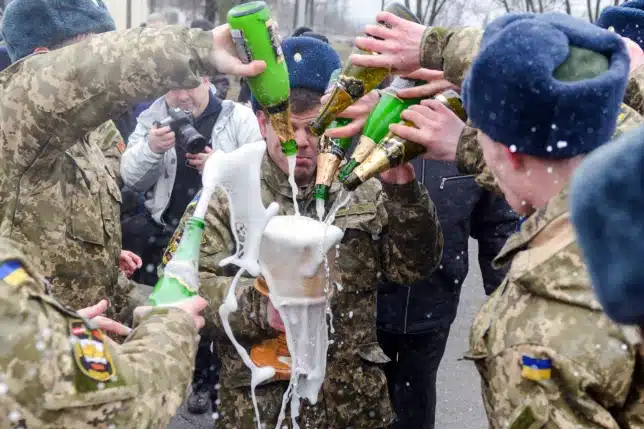Per reports, “excessive drinking” among Russian soldiers in Ukraine is to blame for a “especially high” number of their fatalities, injuries, and crimes.
The UK Ministry of Defence (MoD) reported that a “substantial percentage” of Vladimir Putin’s soldiers had passed away from “non-combat reasons,” such as drunkenness, in a daily update on Twitter.
The majority of Soviet soldiers were killed or wounded in battle, but other factors, such as “bad weapon handling drills,” “alcohol misuse,” and weather-related injuries like hypothermia, were also to blame.
The MoD said: ‘While Russia has suffered up to 200,000 casualties since its full-scale invasion of Ukraine, a significant minority of these have been due to non-combat causes.
‘On March 27, 2023, a Russian Telegram news channel reported there have been ‘extremely high’ numbers of incidents, crimes, and deaths linked to alcohol consumption amongst the deployed Russian forces.’
It said that Russian commanders ‘likely identify pervasive alcohol abuse as particularly detrimental to combat effectiveness’.
The MoD added despite the negative impact alcohol is having on troops, ‘heavy drinking [is] pervasive across much of Russian society’ and ‘it has long been seen as a tacitly accepted part of military life, even on combat operations’.
The report is another damning indictment on Russian’s struggling forces, after claims troops have been sent to war with little training and poor equipment.
Morale among soldiers has apparently been low for many months, after forces were told at the start of the war it would be an easy win for Russia.
Currently, much of the fiercest fighting is happening around the city of Bakhmut, in Eastern Ukraine.
Today it was reported that the head of Russia’s Wagner mercenary group claimed Bakhmut was now Russian ‘in a legal sense’, after raising a Russian flag over its city hall.
But he admitted Ukrainian forces were still concentrated in western districts.
Although Russia is seen as a nation of big drinkers, the Sun reports that its alcohol consumption per capita is only slightly higher than in the UK, with 11.7 litres compared to the UK’s 11.4 litres.\

